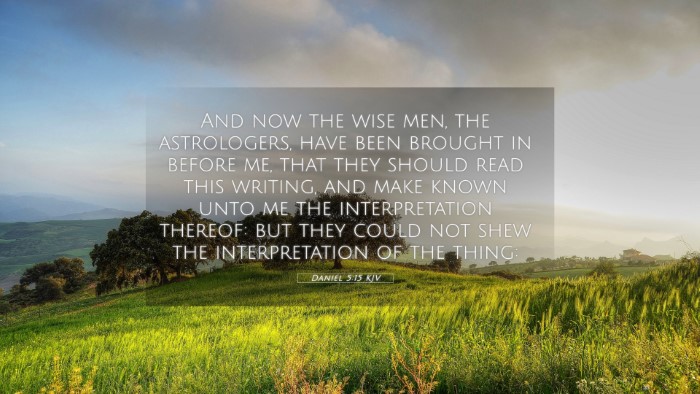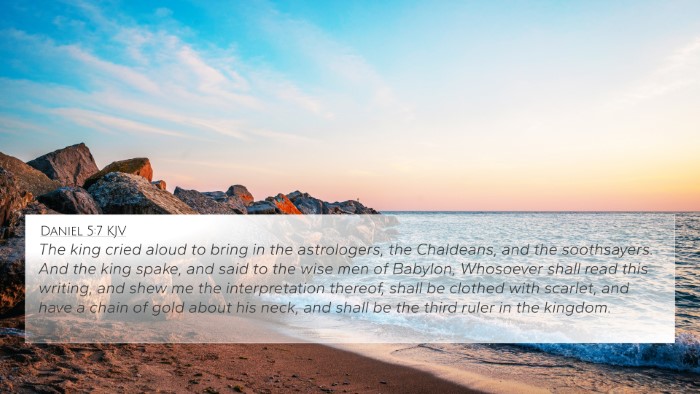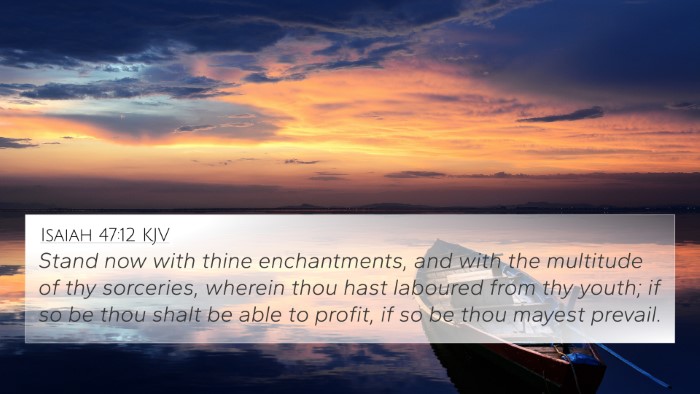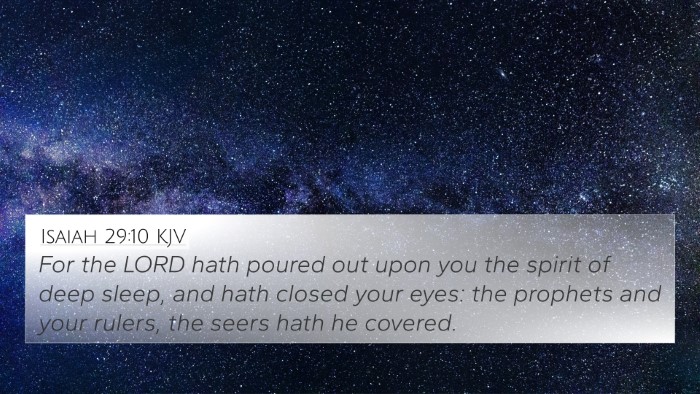Understanding Daniel 5:15
Daniel 5:15 is a part of a significant narrative about King Belshazzar's feast and his disturbing encounter with the mysterious handwriting on the wall. This verse illustrates the king's anxiety about the unknown message and highlights the themes of divine judgment and responsibility.
Verse Context
In this verse, Belshazzar calls for Daniel to interpret the writing on the wall, emphasizing his desperation as he has heard of Daniel's ability to interpret dreams and solve riddles. This moment encapsulates the tension between the earthly power of kings and the divine power represented by God's prophets.
Commentary Insights
- Matthew Henry: Henry suggests that Belshazzar's request for Daniel reflects a troubled heart seeking answers from a man of God. Belshazzar recognizes the wisdom and insight gifted to Daniel, even amidst his own arrogance and sacrilege.
- Albert Barnes: Barnes emphasizes that the king's call for Daniel indicates his acknowledgment of the limitations of his own magicians and wise men, pointing to the divine wisdom that operates through God's chosen vessels even in hostile environments.
- Adam Clarke: Clarke notes that the gathered wise men represent the failure of human wisdom, contrasting the supernatural knowledge that Daniel possesses, further demonstrating God's supremacy over false gods.
Key Themes
- Divine Judgment: The writing on the wall serves as a symbol of God's impending judgment not just against Belshazzar, but also against those who defy His laws.
- Recognition of Divine Authority: Belshazzar’s request for Daniel illustrates a recognition of true authority over falsehood, indicating that wisdom comes from God alone.
- Human vs. Divine Wisdom: The failure of the king’s wise men illustrates a broader theme of the superiority of divine wisdom over human efforts, a recurrent theme throughout scripture.
Bible Verse Cross-References
To fully appreciate Daniel 5:15, consider the following cross-references that illuminate its themes:
- Daniel 2:10-11: The limits of human wisdom are highlighted as the wise men acknowledge they cannot interpret the king's dreams.
- Proverbs 21:30: This verse reminds us that no wisdom can stand against the plans of God.
- Isaiah 47:13: The futility of reliance on human wisdom and sorcery is addressed here, echoing the themes in Daniel's narrative.
- 1 Corinthians 1:19: Paul discusses the foolishness of worldly wisdom in the sight of God, connecting to the wisdom that Daniel represents.
- Job 12:13: Job acknowledges that wisdom and strength belong to God, aligning with Daniel's portrayal as God’s messenger.
- Matthew 10:20: Jesus reassures that when facing trials, His followers will be given words by the Spirit, much like Daniel in his time of need.
- James 1:5: The call to seek God’s wisdom resonates with Daniel's reliance on divine insight in his interpretations.
The Importance of Cross-Referencing in Bible Study
Understanding the connections between Bible verses enhances comprehension and reveals deeper truths within scripture. Tools for Bible cross-referencing such as a Bible concordance or a cross-reference Bible study guide can provide valuable insights. These tools help in identifying connections between various passages, enabling readers to see the broader thematic and doctrinal unity of the Bible.
Conclusion
Daniel 5:15 encapsulates a significant moment of recognition of God's sovereignty through the character of Daniel and highlights the ultimate authority of divine wisdom. The exploration of this verse within its context and through comparative analysis with other scriptures provides a richer understanding of its profound messages. Cross-referencing not only connects verses but also engages readers in a deeper thematic dialogue across the entirety of the Bible.






